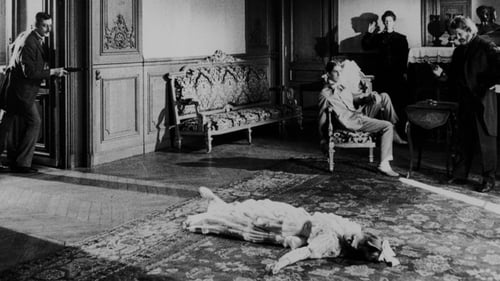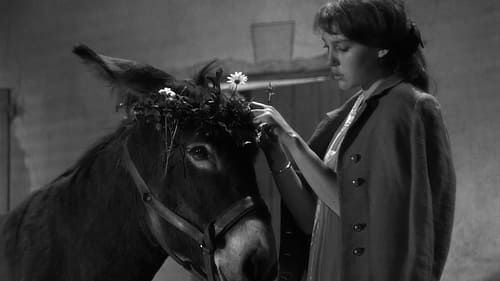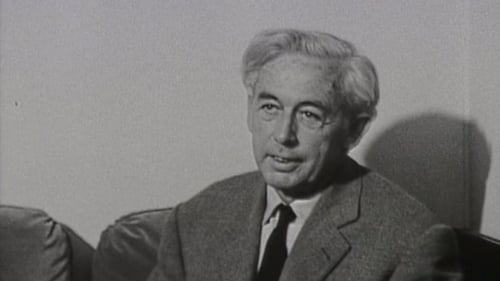Pierre Klossowski
출생 : 1905-08-08, Paris, France
사망 : 2001-08-12

Self
The film contains the interviews with Pierre Klossowski and Jacques Pimpanneau.

Himself
Portrait of french author and painter Pierre Klossowski

Novel
The film opens with a rubber-clad woman stepping sensuously out of a limousine. The camera lovingly closes-up on her stilletoed foot... She enters a dark desolate warehouse, and meets two men, who proceed to chain her up and worship her body. Originally projected on three screens simultaneously. Music by legendary noise musician Merzbow.

Novel
Roberte, 40, resistant during the war, Calvinist and anticlerical, is deputy to the chamber and inspector of Censorship. She married Octave, an old Catholic aesthete, professor of canon law, whom she saves from impeachment for collaboration during the war. He submits his wife to a perverse custom: the laws of hospitality or prostitution of the wife by the husband.

Adaptation
Roberte, 40, resistant during the war, Calvinist and anticlerical, is deputy to the chamber and inspector of Censorship. She married Octave, an old Catholic aesthete, professor of canon law, whom she saves from impeachment for collaboration during the war. He submits his wife to a perverse custom: the laws of hospitality or prostitution of the wife by the husband.

Octave
Roberte, 40, resistant during the war, Calvinist and anticlerical, is deputy to the chamber and inspector of Censorship. She married Octave, an old Catholic aesthete, professor of canon law, whom she saves from impeachment for collaboration during the war. He submits his wife to a perverse custom: the laws of hospitality or prostitution of the wife by the husband.

Writer
Two narrators, one seen and one unseen, discuss possible connections between a series of paintings. The on-screen narrator walks through three-dimensional reproductions of each painting, featuring real people, sometimes moving, in an effort to explain the series' significance.

Thanks
제 3 제국의 운명이 끝을 향해가고 있을 무렵, 타락한 이탈리아 귀족들 네 사람이 성욕을 마음껏 분출할 수 있는 천국을 만들기로 합의한다. 악명이 자자한 뚜쟁이 네 사람을 확보한 뒤 나치군인 몇 사람을 끌어 모은다. 이 타락한 귀족들은 이탈리아 10대 소년 소녀 백여 명을 강제로 데려와 "재미와 게임"을 위해 외딴 빌라에 가둬 놓는다. 권력자들은 매일 어떤 방식으로 성욕을 분출할지 회의하고 그 수위도 점점 높아지는데…

Merchant
당나귀는 한 농장의 어린아이에게 사랑받는 애완동물로서 인간과 첫 인연을 맺게 되지만, 곧 한 젊은 여성의 손에 넘겨지면서 힘든 삶의 여정을 시작하게 된다. 그 여성의 삶은 잔인한 애인에게 능욕당한 뒤 비참하게 살해되는 것으로 끝을 맺고, 새로 당나귀의 주인이 된 그녀의 애인은 당나귀에게 매질을 하며 괴롭힌다. 그러나 그녀의 애인 역시 불행한 최후를 맞게 되고, 당나귀는 빵집 주인의 손을 거쳐 가이드 동물이 되기도 하고, 서커스단의 스타가 되기도 하며, 쟁기를 끌 수밖에 없는 초라한 신세로 지내기도 한다. 이러한 힘든 삶이 끝나갈 무렵 당나귀는 한 나이든 방앗간 주인의 소유물이 되는데...

Self
A documentary, originally produced in 1966 for the French TV series "Pour le plaisir," about Robert Bresson's film "Au Hasard Balthazar," featuring interviews and discussions with Bresson, Jean-Luc Godard, Louis Malle, Marguerite Duras and others.

Self
Celluloid and Marble is based on Rohmer's own articles published in "Cahiers du cinéma", discussing film in relation to the other arts, maintaining that, in an age of cultural self-consciousness, cinema was “the last refuge of poetry” - the only contemporary art form from which metaphor could still spring naturally and spontaneously.








